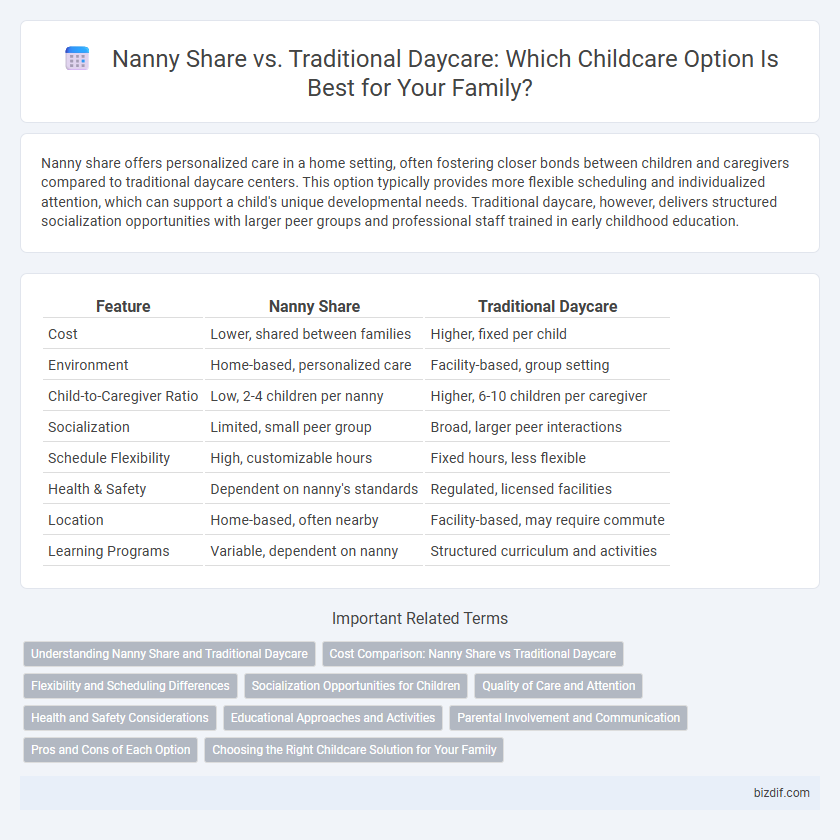Nanny share offers personalized care in a home setting, often fostering closer bonds between children and caregivers compared to traditional daycare centers. This option typically provides more flexible scheduling and individualized attention, which can support a child's unique developmental needs. Traditional daycare, however, delivers structured socialization opportunities with larger peer groups and professional staff trained in early childhood education.
Table of Comparison
| Feature | Nanny Share | Traditional Daycare |
|---|---|---|
| Cost | Lower, shared between families | Higher, fixed per child |
| Environment | Home-based, personalized care | Facility-based, group setting |
| Child-to-Caregiver Ratio | Low, 2-4 children per nanny | Higher, 6-10 children per caregiver |
| Socialization | Limited, small peer group | Broad, larger peer interactions |
| Schedule Flexibility | High, customizable hours | Fixed hours, less flexible |
| Health & Safety | Dependent on nanny's standards | Regulated, licensed facilities |
| Location | Home-based, often nearby | Facility-based, may require commute |
| Learning Programs | Variable, dependent on nanny | Structured curriculum and activities |
Understanding Nanny Share and Traditional Daycare
Nanny share involves two or more families sharing a single caregiver in one household, which can lead to personalized attention and flexible schedules at a lower cost than traditional daycare centers. Traditional daycare centers provide structured group care with certified staff, regulated environments, and socialization opportunities among multiple children in a dedicated facility. Understanding the differences in caregiver-to-child ratio, cost, location, and social interaction helps parents make informed childcare decisions.
Cost Comparison: Nanny Share vs Traditional Daycare
Nanny shares typically cost 30-50% less than traditional daycare centers by splitting expenses between families while providing personalized care in a home setting. Traditional daycare averages $200 to $300 per week, whereas nanny shares can reduce individual costs to approximately $100 to $150 weekly. Savings from nanny shares often increase with more children involved, making them a budget-friendly alternative to conventional daycare without compromising on attention or safety.
Flexibility and Scheduling Differences
Nanny share arrangements offer greater flexibility in scheduling, allowing parents to tailor childcare hours to their specific needs compared to traditional daycare centers, which operate on fixed hours and set enrollment periods. Parents in nanny shares can coordinate pick-up and drop-off times directly with the caregiver, accommodating varying work schedules and spontaneous changes more easily. Traditional daycare centers often require advance notice for schedule adjustments and enforce strict attendance policies, limiting adaptability for families with irregular or dynamic routines.
Socialization Opportunities for Children
Nanny shares provide personalized socialization opportunities by allowing children to interact closely with a small group of peers in a home-like environment, fostering stronger bonds and tailored social development. Traditional daycare centers offer diverse social settings with larger groups of children, promoting adaptability and exposure to a variety of social situations. Both environments support essential social skill growth, but nanny shares emphasize intimate, consistent peer interactions while traditional daycare encourages broader social engagement.
Quality of Care and Attention
Nanny share arrangements provide personalized, one-on-one attention with a consistent caregiver, often resulting in higher quality individual care compared to traditional daycare settings. Traditional daycare centers typically have lower child-to-caregiver ratios, but the attention per child can be limited due to group activities and varying caregiver assignments. Parents seeking tailored developmental support and close supervision might prefer nanny shares, while those valuing socialization in a structured environment may lean toward traditional daycare.
Health and Safety Considerations
Nanny share arrangements often provide a controlled environment with fewer children, reducing exposure to contagious illnesses compared to traditional daycare centers, which typically serve larger groups and may have higher infection risks. Health and safety protocols in traditional daycare are usually regulated by state standards, including regular sanitization and certified caregivers, while nanny shares rely heavily on individual caregivers' practices and home cleanliness. Parents must weigh the personalized attention and lower exposure in nanny shares against the structured safety policies and socialization opportunities present in traditional daycare settings.
Educational Approaches and Activities
Nanny share arrangements often provide personalized educational activities tailored to individual children's developmental stages, promoting one-on-one attention and flexible learning schedules. Traditional daycare centers typically implement structured curriculums based on early childhood education standards, offering group activities that encourage socialization and collaborative learning among peers. Both approaches prioritize cognitive, emotional, and motor skill development, but nanny shares adapt more easily to specific learning interests and paces.
Parental Involvement and Communication
Nanny share arrangements foster higher parental involvement through direct daily communication and personalized updates, enabling parents to actively participate in their child's development. Traditional daycare centers typically offer structured communication schedules, such as weekly reports or digital apps, but may limit real-time interaction with caregivers. The personalized nature of nanny shares enhances transparency and responsiveness, creating a more tailored caregiving experience compared to the standardized communication methods of traditional daycare.
Pros and Cons of Each Option
Nanny share offers personalized care and a flexible schedule, often resulting in a lower cost per family compared to traditional daycare, but it may lack the structured curriculum and social interaction opportunities found in daycare centers. Traditional daycare provides a consistent routine with trained staff and diverse peer interaction, though it can be less flexible and more expensive per child. Parents must weigh individual family needs, such as flexibility and socialization, when choosing between the intimate setting of a nanny share and the comprehensive programming of traditional daycare.
Choosing the Right Childcare Solution for Your Family
Nanny shares offer personalized care and flexible scheduling, often resulting in a more intimate environment compared to traditional daycare centers that follow structured group routines and state regulations. Families prioritizing individual attention and lower child-to-caregiver ratios might prefer nanny shares, while those seeking socialization opportunities and established educational programs often lean towards traditional daycare. Evaluating factors such as cost, location, caregiver qualifications, and your child's temperament helps determine the optimal childcare solution for your family's unique needs.
Nanny Share vs Traditional Daycare Infographic

 bizdif.com
bizdif.com